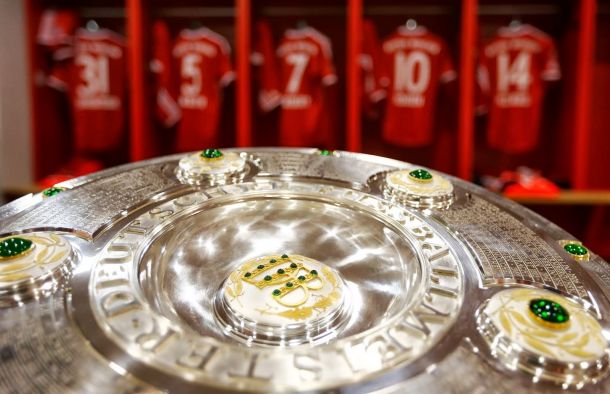German football is undoubtedly an international power - A juggernaut of the game slugging it out with Spain and England year after year at club level in the constant jostle for position between the Bundesliga, La Liga and the Premier League to earn the title of top dog, whilst having reached the absolute pinnacle of international superiority with their 2014 FIFA World Cup triumph. Revered for the incredible production line of youthful talent being developed, the top division of German football has won many admirers with entertaining action on the pitch, plenty of history and, most importantly, character and unrivalled standing by principles. However, this was not always the case, for the Bundesliga struggled and stagnated in the mid-1990’s to the early 2000’s just like the national team did. In fact, it was a direct result of the lack of quality and progressive thinking in the Bundesliga that Die Nationalmannschaft became an afterthought - Once glorious, but a seemingly spent force.
The signs of what was to come were becoming more and more apparent through the 1990’s, as then-German national team manager Berti Vogts began realizing that there was next to no young talent coming through domestically to take over from the established, yet ageing players. Germany was resting on its laurels, he warned, and called for Bundesliga clubs to look to local young players rather than opting for established foreign players. The problem is, the clubs themselves had no option to call upon youth academy players, for there simply weren’t many remotely good enough for top-level football. What only served to make things worse was the lack of thorough scouting and talent identification - Particularly in the further reaches of Germany, some distance from the traditionally 'big' cities. A damning indication of what the situation was like is the fact that Miroslav Klose, the now-legendary top scorer in FIFA World Cup history, was still playing in the fifth division of the German football pyramid at 21 years of age because scouts rarely, if ever, made the long trek to the obscure corner of the country where he plied his trade. This fact would, later, prompt the Director of the Extended Talent Promotion Programme, Jörg Daniel, to proclaim that “If the talent of the century happens to be born in a tiny village behind the mountains, we will be sure to find him”.
“We all have to look at the national team as the 19th - And best - Team in the Bundesliga”
-Bayer Leverkusen CEO Wolfgang Holzhäuser in a crisis meeting held shortly after a disastrous Euro 2000 which lead to the Extended Talent Promotion Programme being put in action
This Extended Talent Promotion Programme was implemented in 2002, with the DFB and Bundesliga clubs both undertaking the huge project of turning the landscape of German football around completely, at significant cost. In fact, initial investments were an annual average of €48 million - Which continues to grow steadily to this day. However, before anything else, the clubs and DFB had to first work towards a common goal: Strengthening the national team to the mutual benefit of both parties involved. It is no secret that clubs prioritize winning over helping any national team, and that is an undisputed case all around the world. If a club, any club, is in the position to buy proven, foreign players who could help them win trophies, they would do it without hesitation, rather than having to bet the success of the club on youngsters actually developing into top-class players just to help potentially improve a given national team. Thus, the DFB and DFL introduced regulations that forced every Bundesliga club to build and maintain a Center Of Excellence to develop and nurture talent, while also specifying a set number of youth players who have to be eligible for the German national team and in which ways clubs have to interact with local schools in order to identify talent at the earliest possible stage. Failure to adhere to this would result in the withdrawal of the now-famous Bundesliga licences, which has also gone a long way in ensuring the financial stability of clubs with its stringent economic requirements.
The problem is, there is no sense in developing top talent when they never get the opportunity to take to the pitch at senior level for their clubs. Take Borussia Dortmund as an example - Between 1994 and 1998 they won the German U19 title five years in a row, yet hardly any of these players managed to break into the first-team picture. The reason? BVB had a policy of buying big-name international talent in order to be competitive in Europe, which of course did bring them a Champions League title in 1997 but contributed greatly to the waning powers of Die Nationalmannschaft, and of course their own later financial woes - But that is a story for another article. It was a completely unforeseen external happening that would impact the Bundesliga immensely, and eventually set the league on the right track through nothing more than pure necessity. In 2001, the main television partner for the Bundesliga, Kirch, went bankrupt, which plunged the league into monetary chaos. Almost immediately, the plug was pulled on about €375 million in annual payments, which forced basically every club - Bar Bayern Munich - to offload their high-earners and established players in order to remain afloat. This, of course, forced the clubs to trust in youth, which immensely benefited the quality coming through youth academies as the Extended Talent Promotion Programme began to produce better young players year after year. Interestingly, their financial power in that time of crisis might have actually affected Bayern Munich negatively heading forward, for their youth academy struggles to consistently produce the type of talent that their rivals do - Even leading CEO Karl-Heinz Rummenigge to state publicly that the Bavarians want to focus on improving their youth set-up.
Another key component in the rise of the Bundesliga was the enhancement of training methods, and a re-think in the tactical approach to football. To get the best out of young players, centrally run youth academies invested heavily in the optimization of training methods and schedules. It is a well known fact that players in their late teens are the most susceptible to serious injury - Which could be devastating to a potentially glittering career - Leading to more specialized focus areas when working with younger players rather than fully physically matured footballers. But it was in terms of tactics where the biggest leap occurred, as the likes of Ralf Rangnick to Jürgen Klopp and, more recently, Thomas Tuchel, implemented an unique approach and style to provide a competitive edge against ‘bigger’ and more financially able sides, whilst also disproving an age-old misconception among the German football fraternity that individuals who were not necessarily top players would by default not become top managers. If one lookes the Bundesliga these days it is a far cry from the sorry sight of man-marking and sweeper-based systems that still were the norm up to the 2000’s, and it is a testament to the hard work that was done behind the scenes, in an unseen process which gradually started to gather attention as league success translated to Die Nationalmannschaft, and vise versa.
Although it is oft-overlooked, the social change within Germany also played a key role in strengthening the Bundesliga, with players of varying descent such as Turkey, Poland, Ghana and even Russia, to name a few, choosing to ply their trade in the country they were born in rather than their parents and/or grandparents. It might not seem significant, but it indicates that Germany had fully became an immigrant country, like most other European nations. With the events of World War II, and as recently as 1989 the Berlin Wall, this process has taken much longer than in other countries - Which means that there was not such a large mixed talent pool to choose from up to the early-to-mid 2000’s, as young players largely consisted of ethnic Germans due to many immigrants still not feeling fully at ease representing their adopted country. Now, as we know, Germany is very much the country of choice to play in for integrated locals, and this has helped the Bundesliga immensely, with a much larger pool of talent to choose from - Thus increasing the odds of an elite-level player emerging that once again also serves to benefit the national team. While many foreign stars have once again made their way back to the league with its reputation and relative financial strength restored, it indicates to the success of the Extended Talent Promotion Programme that the majority of Bundesliga players are German, or eligible to represent Germany.
At present, the Bundesliga is in a boom period, with Bayern Munich the crème de la crème in Europe season after season, while great rivals Borussia Dortmund have developed something of a cult following among football fans who love nothing more than seeing the underdog beating all odds, lead by the incomparable Jürgen Klopp. Traditionalists battle with capitalists on a frequent basis, as storied clubs like Borussia Mönchengladbach and Schalke slug it out for European competition with company-run sides Bayer Leverkusen and VfL Wolfsburg. The historians look giants like Hamburger SV, Werder Bremen and VfB Stuttgart struggle along at the foot of the table with doe-eyed wonder, while clubs like 1.FSV Mainz 05, Hannover 96, SC Freiburg and 1.FC Köln attract new fans on a regular basis. Then, of course, you also have the perennial underachievers - Die Alte Dame, Hertha Berlin, and the much derided, but somehow charming 1899 Hoffenheim, plaything of software mogul Dietmar Hopp. The fact is, the Bundesliga has grown exponentially, and for many fans it would be hard to imagine that the league was as limp and uninspiring - And without the character that makes it special today - As it was early in the Millennium.
One can gather that the success of the Bundesliga and that of Die Nationalmannschaft is intrinsically linked, with one hand constantly helping the other, as was envisioned by those tasked with rebuilding German football in a dire era. It really is hard imagining any other country successfully undertaking a task of this magnitude, and it speaks volumes about the men in charge of the DFB and DFL that they managed the notoriously tough task of having clubs and the national team working towards a common goal. As writer Uli Hesse put it, “The most important piece of the German footballing jigsaw puzzle was simple courage. It was courage under pressure, true, but it was courage nonetheless”.
Courage it was, and now the fruits thereof are apparent for all to see.










































